Monatomic ions - Study guides, Class notes & Summaries
Looking for the best study guides, study notes and summaries about Monatomic ions? On this page you'll find 59 study documents about Monatomic ions.
Page 4 out of 59 results
Sort by
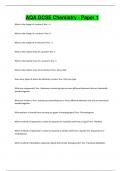
-
AQA GCSE Chemistry - Paper 1
- Exam (elaborations) • 25 pages • 2023
-
- $9.79
- + learn more
AQA GCSE Chemistry - Paper 1 What is the charge of a proton? Ans- +1 What is the charge of a neutron? Ans- 0 What is the charge of an electron? Ans- -1 What is the relative mass of a proton? Ans- 1 What is the relative mass of a neutron? Ans- 1 What is the relative mass of an electron? Ans- Very small How many types of atoms do elements contain? Ans- Only one type What are compounds? Ans- Substances containing two or more different elements that are chemically bonded together What are...
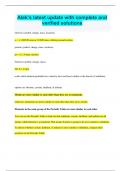
-
Alek’s latest update with complete and verified solutions
- Exam (elaborations) • 15 pages • 2023
- Available in package deal
-
- $9.99
- + learn more
Alek’s latest update with complete and verified solutions electron (symbol, charge, mass, location) e-, -1, .000549 amu or 1/1800 amu, orbiting around nucleus proton (symbol, charge, mass, location) p+, +1, 1.0 amu, nucleus Neutron (symbol, charge, mass) N0, 0, 1.0 amu ecide which element probably has a density most and least similar to the density of rubidium. options are fluorine, cesium, thallium, & indium. Metals are more similar to each other than they are to nonmetals. Likewise, nonm...
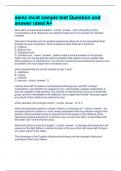
-
aamc mcat sample test Question and answer rated A+
- Exam (elaborations) • 5 pages • 2023
-
Available in package deal
-
- $13.49
- + learn more
aamc mcat sample test Question and answer rated A+when will a compound precipitate? when the product of the concentrations of its respective ions (what it breaks down to) exceeds the solubility constant Channel X transmits only the smallest substances dissolved in the extracellular fluid through the axon membrane. Which substance does Channel X transmit? A. Proteins B. Sodium ions C. Potassium ions D. Chloride ions sodium cations are the smallest of the species listed. You can use t...

-
General Chemistry I Rote Memorization--Printable Flashcard Set 4B: Common Polyatomic and Monatomic Ions & Their Charges (103 Flashcards)
- Class notes • 52 pages • 2023
- Available in package deal
-
- $3.99
- + learn more
General Chemistry I Rote Memorization--Printable Flashcard Set #4B: Common Polyatomic and Monatomic Ions & Their Charges ///This is a printable flashcard set that is centered on the topic of polyatomic & monatomic ions that was introduced in study guide #4 (General Chemistry I--Intro to Chemistry: Molecular Compounds, Hydrated Compounds, Ionic Compounds, Atoms, Molar Mass, and Deriving Formulas (Molecular & Empirical)). Knowing these ions by heart will make a world of a difference if you strugg...
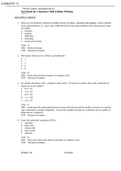
-
Test Bank for Chemistry 10th Edition Whitten.doc Helpful Unhelpful
- Exam (elaborations) • 29 pages • 2022
-
- $10.99
- + learn more
. There are two different common crystalline forms of carbondiamond and graphite. A less common form called fullerene, C60, also exists. Different forms of the same element in the same physical state are calledHow many atoms are in a sulfuric acid molecule?If a sample of butane, C4H10, contains a total of 8.0 103 atoms of carbon, how many molecules of butane are in the sample?Name the molecular compound, HNO3.Name the molecular compound, SO3. a. sulfur oxide b. sulfurous acid c. sulfur tr...
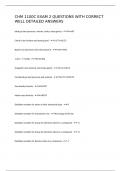
-
CHM 1100C EXAM 2 QUESTIONS WITH CORRECT WELL DETAILED ANSWERS
- Exam (elaborations) • 4 pages • 2024
-
- $10.49
- + learn more
Ideal gas law (pressure, volume, moles, temp given) - PV=nRT Charle's law (volume and temp given) - V1/T1=V2/T2 Boyle's law (pressure and volume given) - P1V1=P2V2 1 atm = ? mmHg - 760 mmHg Avogadro's law (volume and moles given) - V1/n1=V2/n2 Combined gas law (pressure and volume) - P1V1/T1=P2V2/T2 Gas density formula - d=PM/RT Molar mass formula - M=dRT/P Oxidation number for atoms in their elemental state - 0 Oxidation number for monatomic ions - the charge of th...
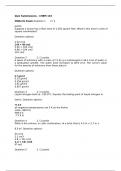
-
CHEM133 Week 7 Midterm Exam (March)
- Exam (elaborations) • 9 pages • 2023
-
- $22.49
- + learn more
1. Question: Suppose a house has a floor area of 2,250 square feet. What is this area in units of square centimeters? 2. Question: A piece of antimony with a mass of 17.41 g is submerged in 46.3 cm3 of water in a graduated cylinder. The water level increases to 48.9 cm3. The correct value for the density of antimony from these data is: 3. Question: Liquid nitrogen boils at –195.8°C. Express the boiling point of liquid nitrogen in kelvin. 4. Question: What is the volume, in cubic centimeter...
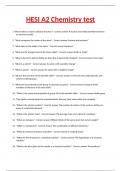
-
HESI A2 Chemistry test questions with correct and verified answers. Graded A+
- Exam (elaborations) • 12 pages • 2024
- Available in package deal
-
- $7.89
- + learn more
HESI A2 Chemistry test 1. What makes an atom's physical structure? - Correct answer A nucleus and orbits(sometimes known as electron clouds)" 2. "What composes the center of the atom? - Correct answer Protons and neutrons" 3. "What spins in the orbits of an atom? - Correct answer Electrons" 4. "What are the energy levels of the atom called? - Correct answer Shells or orbits" 5. "What is the term used to define an atom that is electrically charged? - Correct answer Ionic...
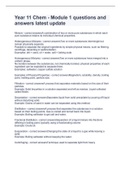
-
Year 11 Chem - Module 1 questions and answers latest update
- Exam (elaborations) • 9 pages • 2022
- Available in package deal
-
- $9.49
- + learn more
Year 11 Chem - Module 1 questions and answers latest updateMixture A combination of two or more pure substances in which each pure substance retains its individual chemical properties. Heterogeneous Mixtures Two or more substances intermingle but remain physically separate. Possible to separate the original ingredients by simple physical means, such as filtering, centrifuge, decanting or sedimentation. Examples: dirt + sand, oil + water, salt + baking soda 01:10 01:33 H...
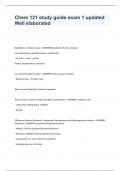
-
Chem 121 study guide exam 1 updated Well elaborated
- Exam (elaborations) • 6 pages • 2023
-
Available in package deal
-
- $12.99
- + learn more
Hypothesis vs Theory vs Law - ANSWERS Hypothesis: If, then, because Law: Statement or equation about a relationship - ex: force = mass * gravity Theory: Explains why a law exists Law of Conservation of Mass - ANSWERS Mass is always constant - Reactant mass = Product mass They are used (upheld) in chemical equations Three common states of matter and their characteristics - ANSWERS - Solid (s): color - Liquid (aq): melting point, solubility - Gas (g): Difference between Elements...

Study stress? For sellers on Stuvia, these are actually golden times. KA-CHING! Earn from your study resources too and start uploading now. Discover all about earning on Stuvia


